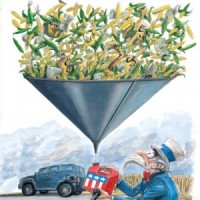What can one pound of uranium do?
Rod Adams at Atomic Insights Blog posted this video of a massive nuclear ship, the 50 Years Since Victory. This icebreaker pushes through frozen waters via two nuclear generators, giving the ship a 70,000 horsepower kick.- Thursday, December 9, 2010

 Corn is in everything. It’s in your soda, syrup, shaving cream and licorice. You can find corn in batteries, ink and mayonnaise. There are thousands of uses for corn, but the least efficient and most costly use is ethanol.
Ethanol is in the news because Congress is considering a
Corn is in everything. It’s in your soda, syrup, shaving cream and licorice. You can find corn in batteries, ink and mayonnaise. There are thousands of uses for corn, but the least efficient and most costly use is ethanol.
Ethanol is in the news because Congress is considering a